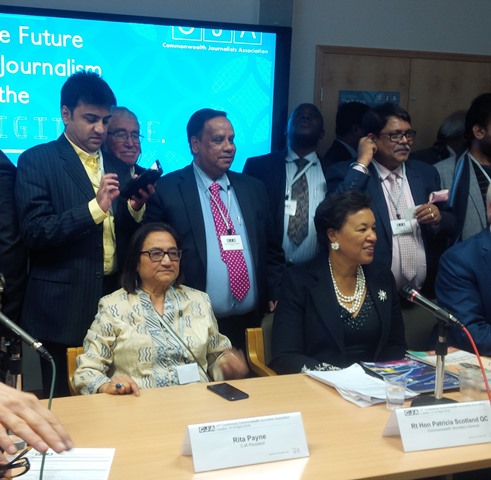 Rita Payne and Patricia Scotland launched the Commonwealth Journalists' Association conference in London [credit: Debbie Ransome]
Rita Payne and Patricia Scotland launched the Commonwealth Journalists' Association conference in London [credit: Debbie Ransome]
Rita Payne stepped down in April as the President of the Commonwealth Journalists’ Association (CJA). She still sits as a Board member of the Round Table. She spoke to Round Table’s website about journalism, the Commonwealth and the value of news analysis.
Round Table: You have recently stepped down as President of the Commonwealth Journalists Association, what role do you think the CJA can play in today’s world?
Rita Payne: With a disturbing rise in killings, arrests and general victimisation of journalists inside and outside the Commonwealth, there is a greater need than ever for the CJA. The association has an important role to play in drawing attention to attacks on individual journalists and highlighting why a free media is essential for a healthy democracy.
RT: In the age of more and more digital platforms and with the rise of citizen journalism, is the profession of journalism and the age of the big media houses waning?
RP: It became clear at our conference in April that we have to be careful not to view media developments from a mainly western perspective. In a period of citizen journalism, there is undoubtedly a blurring in the definition of who is a journalist and the big media houses have seen a decline in their power and influence. Again, this applies mainly to the “old” Commonwealth countries like the UK, Canada and Australia along with the U.S. and other western nations. In India, for example, there is a growth in newspapers. Digital media is not so easily accessible in many countries in Africa, Asia and the Pacific. The main problems for journalists in these regions are poor pay and inadequate training which leaves them vulnerable to pressure and threats from governments, corporations and other powerful forces. The media across the world is going through a process of transition. With such a cacophony of voices, we may reach a stage when people will actively seek out journalists, on any platform, who are knowledgeable, professional, trustworthy and have solid credentials. It may be wishful thinking but I think it is too early to write off journalism as a profession.
RT: What are your plans now that you are president-emeritus of the CJA?
RP: I plan to devote more time to my work as a freelance journalist and media consultant and pursue my other interests. Apart from being a member of the RT editorial board and the CHRI executive board, I am also an adviser to The Democracy Forum and Asian Affairs magazine and a number of other organisations. I already have requests to moderate or speak at a series of meetings, help to organise book launches and other events. I hope to fit in tennis, yoga and take our dog for long walks. My diary is already filling up fast.
RT: You are still on the board of the Round Table; what do you see as the long term role for Round Table in a period of Buzzfeed news lists and 140-character Twitter notifications?
RP: The RT is an academic journal which features serious, thought-provoking reports on a range of issues. In the long-term, exposure on Buzzfeed, Twitter and other digital outlets will help to extend its reach across the world and attract younger readers.
About the CJA.
About Rita Payne.



